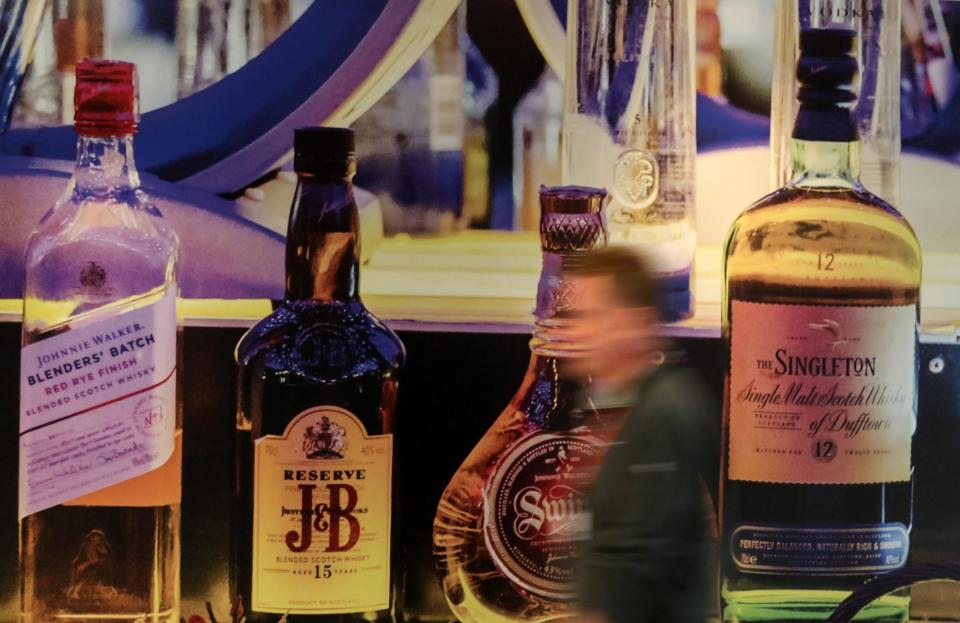Don Julio maker Diageo reels from a profit-sinking inventory hangover as Latin America’s drinkers work through a pandemic spirits glut

Diageo, the group behind Jonnie Walker, Don Julio, and Guinness, knows a thing or two about hangovers. Unfortunately, it’s going to take more than a few painkillers to help it overcome its own lengthy battles with an inventory pile-up in Latin America that refuses to go away.
The drinks maker registered an overall 5% fall in profits in the first half of its latest financial year, while sales declined 0.6%—but it's one location in particular where consumers seem less keen to bring in 2024 with a new order of spirits.
Latin Americans shunning spirits
Despite growing sales in Europe, Africa, and Asia, Diageo fared much worse across the Atlantic, particularly in its Latin America and the Caribbean (LAC) region.
Revenue in the region collapsed by 23% in the first half of Diageo’s 2024 financial year (which ends in August), driven by sluggish sales of the group’s whiskey and tequila offerings.
The group experienced a double-digit decline in its scotch products in Brazil, while Mexico suffered a similar decline in Don Julio Tequila.
The LAC region made up about 11% of the group’s net sales in 2023. Unfortunately, that region is now the source of a tight supply-chain pile-up. Diageo is waiting for depletions to outweigh shipments to its core markets in the wake of COVID-19, but it is taking longer than anticipated as consumer sentiment hits the rocks.
The company suffered a huge share price decline in November after releasing a profit warning thanks to this sluggish growth in the region.
“Distributors and retailers are sitting on too much unsold stock which has a negative knock-on effect for future orders from Diageo until that overhang works its way through the system,” said Russ Mould, investment director at AJ Bell, an investment platform and stockbroker.
“Perhaps drinks cabinets at home were well-stocked during the pandemic and people still have plenty of spirits left over, so there is no need to keep buying more for a while?”
Downtrading too
There was evidence of product downtrading among consumers in the region in the face of severe macroeconomic headwinds. Stubbornly high inflation and rising food insecurity, as pointed out by the IMF, have seen consumers opt for bargain drink offerings as opposed to some of Diageo’s premium brands.
One of the biggest victims of these downgrades was Casamigos, the tequila brand acquired from actor George Clooney for up to $1 billion in 2017. Sales of the drink declined 14% in the first half of the financial year.
There were some bright spots for Diageo, including double-digit growth in Europe for its Irish stout Guinness, and continued expansion for its spirits business in its growing Asian markets backed by its conviction of a “premiumization” of the drinking market.
However, the fact that shares in the group were down just 3.5% in early Tuesday morning trading is an indication of just how expected the underwhelming results were.
Drinks makers like Diageo facing headwinds
It has been a year to forget for Diageo. Shares in the group have dipped by a third since reaching a peak in late 2021, owing to the COVID-19 drinking boom that now appears to be contributing to the group’s problems.
The profit-warning-induced knock to the group’s value in November is just one of many obstacles that have pushed down its share price in the last couple of years.
In early January, the group got caught up in a tussle between China and the European Union. China launched an anti-dumping investigation into EU brandy after the bloc targeted EV imports from the BYD-making country.
Jefferies said while Diageo wouldn’t be directly affected by any backlash from China, the group faced an indirect exposure at 2%–3% of net income from its joint venture with Bernard Arnault’s LVMH, Reuters reported.
Drink makers are also facing an existential threat from a growing tide of teetotalism, especially from Gen Z drinkers. The wine industry in particular is in the midst of this battle, as younger customers exhibit much less appetite for the drink than their parents.
However, Diageo thinks it might have an edge in the long run to offset this trend. The company hopes the “premiumization” of drinking, which has seen consumers move away from wine and beer and toward higher margin spirits, places the group on a strong footing going forward.
“We believe in the fundamental strength of our business and expect our advantaged portfolio to benefit from international spirits continuing to gain share of Total Beverage Alcohol and premiumization trends, combined with continued investment in marketing and innovation,” the group said in its latest earnings release.
This story was originally featured on Fortune.com
